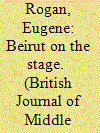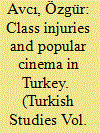| Srl | Item |
| 1 |
ID:
181102


|
|
|
|
|
| Summary/Abstract |
In the immediate aftermath of the First World War, two nationalist theatre companies in Beirut staged a new play in 1919 encapsulating the civilian hardships of four years of the war. While little is known of the author, George Murad, details from the preface and dedication to the printed edition would situate him among pro-French Maronite Christians seeking independence for a greater Lebanon under French protection. The play, “Beirut on the Stage,” would appear to have been an example of political theatre seeking to validate the wartime suffering of Lebanese Christians through a vision of independence that, by the time the play was published in 1920, had already been undermined by French measures to colonise, rather the liberate, Greater Lebanon.
|
|
|
|
|
|
|
|
|
|
|
|
|
|
|
|
| 2 |
ID:
098511


|
|
|
| 3 |
ID:
180537


|
|
|
|
|
| Summary/Abstract |
Arabesk is a trademark of popular culture in Turkey. At its foundation lie injuries of class, emotional wounds that society inflicts on people’s sense of dignity and freedom. Literature on arabesk has long underemphasized this salient fact. A syntagmatic and paradigmatic analysis of the narrative structure in thirty melodramas shows that the agony around which arabesk stories unfolds is rooted in class conflict. This study also reveals remarkable parallels between depictions of love in arabesk films from decades ago and the lower classes’ imagination of love today. Thereby, it provides confirmation of the importance of assessing the works of popular culture accurately if we are to better understand the psyche of their target audience in Turkey (and elsewhere in the capitalist world), which is primarily the subaltern segment of society.
|
|
|
|
|
|
|
|
|
|
|
|
|
|
|
|
| 4 |
ID:
097725


|
|
|
|
|
| Publication |
2010.
|
| Summary/Abstract |
This article examines the literary strategies that shape contemporary Dalit fictional prose in Hindi. Based on the analysis of two short stories by the prolific Dalit writers Omprakash Valmiki and Jaiprakash Kardam, it is argued that the contributions of Dalit literature arise today not only in the context of a social movement, but are increasingly apparent through the development of a new, hybrid melodramatic-realist literary aesthetic. New critical scholarship of Dalit literature in India is therefore needed to appreciate the ongoing expansion of such forms of literature across linguistic and geographical regions in India as a postmodern sphere of subaltern social protest. Such fresh analytical attention to Dalit strategies of artistic expansion and literary growth will undoubtedly enliven the hitherto largely bland sociological conversations about Dalit literature.
|
|
|
|
|
|
|
|
|
|
|
|
|
|
|
|